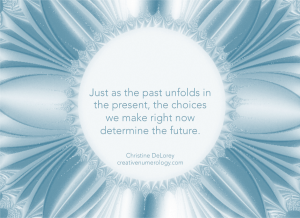Phyllis Edgerly Ring's Blog, page 27
May 25, 2015
What gives energy rather than takes it

Photo: Diane Kirkup
It’s a very powerful choice, the option we’re given each day, about where we direct our energy and attention.
At its heart, it seems to be a matter of how we might choose to shift and raise our emotional tone.
This is the daily gift, the one already bestowed, that we needn’t earn or search for or figure out how to “get”. It’s waiting in each day, hour, and moment, in unlimited supply. The limits arise from how we might overlook, dismiss, or ignore it. This may be the root of the very definition of ignorance.
Yet the mercy is that even when we forget, overlook, or ignore, we can begin again, as many times as we like, or need. And the grace is that the more that we do, the more that practice seems to help us reach for the kindness of this option more quickly – to want to reach for it, even when the pull from inner insistence, demand to be right, tug at us especially hard. It can feel like an act of empowerment to choose this constructive response over allowing those other reactions to run wild like a pack of unruly dogs.
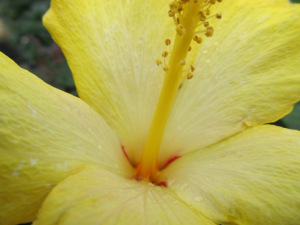
Photo: Diane Kirkup
Why does that old pull succeed in snagging us at all? The answers are typically the usual suspects. Firstly, it will bring some sort of pay-off – some degree of pleasure, certainly, and also, some element of pain can be a pay-off, too, because it’s more fuel for the story we’ll tell ourselves about it, and the identity we’ll start to spin and weave around that.
Oh, the sweet freedom of stepping into the mid-air spaciousness of not choosing any of those old, misdirected habits, those premature conclusions based only on past experience. The lower end of the emotional scale has one agenda: let’s wallow in what it means to be miserable, and let’s be right. And, perhaps, an even bigger agenda: let’s avoid facing the reality of the matter at all.

Photo: Diane Kirkup
Eroding into a negative and displeased emotional tone is usually about either resisting or running away from emotion that arises, rather than actually meeting it and feeling. Like waves that are going to wash up on the beach of life, feelings will come, and bring with them an energy and a momentum.
When I don’t invest in a lower emotional tone, don’t buttress and reinforce it, shrug it on like a cloak, take it up like a duty or a sentence, there’s an inner vision, a spirit of faith just waiting to reach toward the lift and propelling joy of a higher one. It gives energy rather than taking it. It feels wonderful, like a favorite memory. It’s always a possibility, as long as some story, some made-up figment that’s never been real, isn’t allowed to convince me otherwise.
I must remind myself that the human world offers very little reinforcement for this; often, none. But I am well capable of remembering what does — and of asking for help when I forget.


May 23, 2015
The increase and advance of love
 It’s a special time for Bahá’ís around the world as we remember The Báb.
It’s a special time for Bahá’ís around the world as we remember The Báb.
His life and the spiritual revolution in its story was my first encounter with the Revelation of the Bahá’í Faith. From those earliest days, these words of The Báb’s have traveled with my grateful heart:
“O peoples of the world! Whatsoever ye have offered up in the way of the One True God, ye shall indeed find preserved by God, the Preserver, intact at God’s Holy Gate.”

Every sparrow, every hair of our head, every feather and seed and blade of grass is accounted for.
Imagine the real spiritual presence of each one of our willing efforts and actions.
It is easy to feel dismayed by the world as we see it around us.
But the building of the good is what is preserved — the increase and advance of love in the coming forth of what is of God.


May 20, 2015
Presence dissolves the past

Painting: “Ice Flow” by Diane Kirkup / https://www.etsy.com/shop/DKirkupDesigns
As you become more conscious of your present reality, you may suddenly get certain insights as to why your conditioning functions in those particular ways; for example, why your relationships follow certain patterns, and you may remember things that happened in the past or see them more clearly.
That is fine and can be helpful, but it is not essential.
What is essential is your conscious presence. That dissolves the past. That is the transformative agent.
So don’t seek to understand the past, but be as present as you can. The past cannot survive in your presence. It can only survive in your absence.
~ Eckhart Tolle
The minute you say, ‘My memory isn’t what it used to be’ or ‘I can’t remember a thing today,’ you are actually training your brain to live up to your diminished expectations.

Photo: Fran Berman
Low expectations mean low results …
But what if you do the opposite? What if you teach your brain to be unlimited?
Think of your brain as being like a Steinway grand piano. All the keys are in place, ready to work at the touch of a finger. Whether a beginner sits down at the keyboard or a world-renowned virtuoso like Vladimir Horowitz or Arthur Rubinstein, the instrument is physically the same. But the music that comes out will be vastly different.
The beginner uses less than 1 percent of the piano’s potential; the virtuoso is pushing the limits of the instrument.”
~ Deepak Chopra


May 19, 2015
Presence dissolves the past

Painting: “Ice Flow” by Diane Kirkup / https://www.etsy.com/shop/DKirkupDesigns
As you become more conscious of your present reality, you may suddenly get certain insights as to why your conditioning functions in those particular ways; for example, why your relationships follow certain patterns, and you may remember things that happened in the past or see them more clearly.
That is fine and can be helpful, but it is not essential.
What is essential is your conscious presence. That dissolves the past. That is the transformative agent.
So don’t seek to understand the past, but be as present as you can. The past cannot survive in your presence. It can only survive in your absence.
~ Eckhart Tolle
The minute you say, ‘My memory isn’t what it used to be’ or ‘I can’t remember a thing today,’ you are actually training your brain to live up to your diminished expectations.

Photo: Fran Berman
Low expectations mean low results …
But what if you do the opposite? What if you teach your brain to be unlimited?
Think of your brain as being like a Steinway grand piano. All the keys are in place, ready to work at the touch of a finger. Whether a beginner sits down at the keyboard or a world-renowned virtuoso like Vladimir Horowitz or Arthur Rubinstein, the instrument is physically the same. But the music that comes out will be vastly different.
The beginner uses less than 1 percent of the piano’s potential; the virtuoso is pushing the limits of the instrument.”
~ Deepak Chopra


May 18, 2015
Feeding the Holy, crafting a spirit
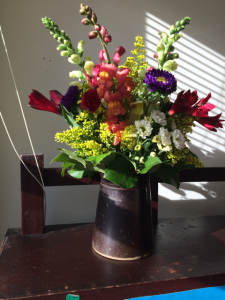
Photo: Thad Ring
So many thoughtful souls keep us company when we’re on a path of creating.
“Creativity arises out of the tension between spontaneity and limitations, the latter (like the river banks) forcing the spontaneity into the various forms which are essential to the work of art or poem,” said Rollo May.
Kurt Vonnegut said, “The practice of art isn’t to make a living. It’s to make your soul grow.”
“People don’t talk about the soul very much anymore,” Anna Quindlen has noted. “It’s so much easier to write a résumé than to craft a spirit.”

Photo: Lara Kearns
“Weaving, writing and painting our stories into the things we create is a way of feeding the Holy in Nature, which has kept us fed and alive,” says Toko-pa. “And as we put all of our lostness and longing into the beauty we make, we do so knowing that we may never hope for more than to pass on these heirlooms to the young ones so they may find their way home across the songlines, as we have been found by those who made beautiful things before us. If even one generation is denied their inheritance, the story and the way home may be lost.”
As it is said in West Africa, ‘When an elder dies, a library burns to the ground’.”
And finally, this beautiful encouragement from Craig Paterson: “Whatever difficulty you may be working through today, find a point of solace in art. Let it be both comfort and crucible, to rest your weary heart and to transform the dense dark matter of your troubles into something new and clear. Make beauty and vulnerability your allies in your brave journey of becoming.”


May 15, 2015
Right timing is one of life’s kindest gifts
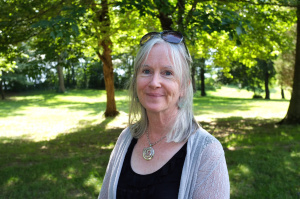 I was grateful to discover this week that the number of reviews at Amazon for Snow Fence Road had reached 100.
I was grateful to discover this week that the number of reviews at Amazon for Snow Fence Road had reached 100.
“… coming to the last page was like saying good-bye to a dear friend,” the kind reader wrote, asking also, in reference to the book’s themes, “Are there miraculous rewards found in healing?”
As the trail of my current novel comes to its end, I’m reflecting again on what my first one has revealed for me. I had a lot of expectations for Snow Fence Road when I began writing it in my 30s. Never did I imagine that when it was finally published, my strongest feeling would be, “Thank heaven this didn’t happen sooner.”
This stage of my life reinforces that anything of value is not only worth waiting for, but subject to a right-timing factor we can never predict. As I’ve attempted to determine and establish the publishing path of The Munich Girl, my next novel, and the the first book I’ll publish myself, I recognize more than ever that greater forces are always at work in the right timing of everything. 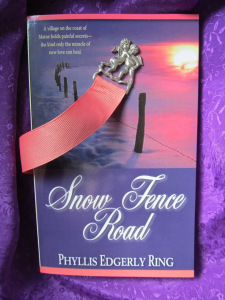
Snow Fence Road looked ready to fly more than 20 years ago when a respected literary agency agreed to represent it. Things seemed on-track for success until life brought changes in the outer world that decided otherwise.
Today, it’s my inner world that appreciates this the most.
Today it’s a different book, in a different world, and I’m a writer with a far different perspective. Two decades ago, this book most likely had a narrow (i.e. months-long) window of time and opportunity to reach readers. Now its possibilities seem as wide as my willingness to follow an ever-unfolding learning curve. Social media and a digital world extend a global reach that astonishes me almost as much as the role readers themselves now play in advancing awareness of and appreciation for the book.
Yes, there are wildly shifting sands in the publishing experience now, but there are horizons I couldn’t have imagined 25 years ago.
READ THE REST AT BoomerCafé: http://www.boomercafe.com/2014/04/02/boomer-authors-reflections-finishing-book-later-life/
 Find more about Snow Fence Road, from Black Lyon Publishing, at: http://www.amazon.com/Snow-Fence-Road-Phyllis-Edgerly/dp/1934912549/ref=sr_1_2?ie=UTF8&qid=1372083362&sr=8-2&keywords=Snow+Fence+Road+Phyllis+Ring
Find more about Snow Fence Road, from Black Lyon Publishing, at: http://www.amazon.com/Snow-Fence-Road-Phyllis-Edgerly/dp/1934912549/ref=sr_1_2?ie=UTF8&qid=1372083362&sr=8-2&keywords=Snow+Fence+Road+Phyllis+Ring


May 13, 2015
Uncovering our inner diamonds
My thanks to Ron Tomanio for this Guest Post, from his Walking the Mystical Path with Practical Feet series:
Surviving Difficult and Painful Events – Unearthing the Diamonds Within
The Great Being saith: Regard man as mine rich in gems of inestimable value. ~ Baha’u’llah
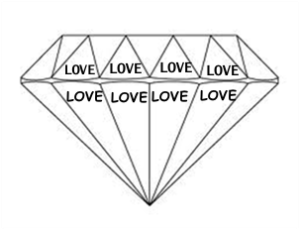 We see sparkling diamonds that have been cut and polished without giving a lot of thought to the difficult mining process that produced such beauty. Unearthing spiritual diamonds can also be a difficult process, but results in fully rounded wondrous qualities that have existed in a state of potentiality within us since the moment of our creation
We see sparkling diamonds that have been cut and polished without giving a lot of thought to the difficult mining process that produced such beauty. Unearthing spiritual diamonds can also be a difficult process, but results in fully rounded wondrous qualities that have existed in a state of potentiality within us since the moment of our creation
If we are fortunate, we have some friends who live lives of beauty every day. Sometimes we are privy to know the difficult and painful events that have shaped them, but more often we see, like the diamonds in a jewelry store, only the finished product.
One such friend was Larry Akeley. Larry’s father was an engineer who had great expectations that his son would follow in his footsteps by pursuing an engineering degree. Larry tried, he really tried, but God did not endow him with that sort of mind. He dropped out of college and his father was furious. He told Larry, “You’re no son of mine!”
 This comment crushed Larry and he spiraled downhill falling every way an individual can fall—drugs, nervous breakdown. and finally, homelessness that led him to live in the New-Hampshire woods in an abandoned cabin. The day came when he decided to choose quick suicide over slow suicide. His plan was to walk out of the woods to the main road turn right and meet up with other drug-users living in the woods and take an overdose. He stood at the crossroads and for reasons he didn’t understand, chose to turn left and away from taking his life, at least for the moment. He had no plan beyond putting one foot in front of the other.
This comment crushed Larry and he spiraled downhill falling every way an individual can fall—drugs, nervous breakdown. and finally, homelessness that led him to live in the New-Hampshire woods in an abandoned cabin. The day came when he decided to choose quick suicide over slow suicide. His plan was to walk out of the woods to the main road turn right and meet up with other drug-users living in the woods and take an overdose. He stood at the crossroads and for reasons he didn’t understand, chose to turn left and away from taking his life, at least for the moment. He had no plan beyond putting one foot in front of the other.
An elderly woman stopped and offered him a ride. He was stunned, but he accepted. She offered to take him to her home where she gave him some of her son’s clothes and allowed him to use her shower. She gave him a hot meal and hope and they became lifelong friends.
Decades went by and Larry’s father developed dementia. His mother became the primary caregiver until she passed away. Then Larry helped take care of his father like the elderly lady took care of him years earlier. Toward the end of his father’s life the nursing home insisted on strapping his father to the bed at night because he would roll out of bed and hurt himself. Seeing his father restrained in this way bothered the soft-hearted Larry. His solution was to sleep at night on the floor next to his father’s bed and let his father fall on his soft, cushy belly. 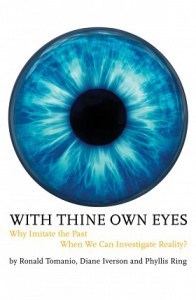
Because he was willing to let his experience help mine his inner diamonds, Larry accessed the educational aspects of his difficult experience while avoiding its potentially destructive aspects. He let it break open his heart, developing facets of the qualities of love and forgiveness that he might not otherwise have acquired.
Larry’s own life came to its end just a few years later. The brilliance of his spiritual transcendence still shines brightly for those of us who knew him here, and love him still.
Ronald Tomanio is a co-author of With Thine Own Eyes: Why Imitate the Past, When We Can Investigate Reality? Find more information about the book at:
Print version at: http://www.bahairesources.com/with-thine-own-eyes.html


May 10, 2015
Entering the soul of things
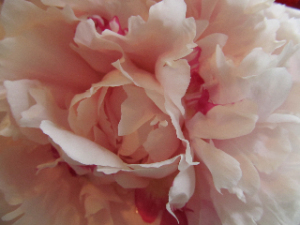
Photo: https://www.etsy.com/shop/DKirkupDesigns
It [the struggle with evil] makes us strong, patient, helpful men and women. It lets us into the soul of things and teaches us that although the world is full of suffering, it is also full of the overcoming of it.
My optimism, then, does not rest on the absence of evil, but on a glad belief in the preponderance of good and a willing effort always to cooperate with the good, that it may prevail.
~ Helen Keller

Photo: Saffron Moser
Become subtle enough
To hear a tree breathe.
Succumb to warmth in the heart
Where divine fire glows.
~ John O’Donohue

Photo: Nelson Ashberger
When you live at the periphery of your being, your thoughts are often scattered, pulling you in different directions, and draining your energy. Too much mental activity leads to overload and, oftentimes, burnout.
When you take the time to ‘go within’ each day, by breathing deeply and fully, feeling the ‘space’ inside yourself, and witnessing your thoughts and emotions without judgment, you return to a very natural, deep sense of aliveness, which is actually your true nature; then your thoughts naturally slow down, and simultaneously gain more power and cohesiveness.
Think of the small, choppy waves that dance across the surface of the ocean; these represent your scattered thoughts. Then visualize the huge waves that rise up from underneath, much like the giants the pro surfers ride. Note the difference in power.
~ Jaime Tanna


May 8, 2015
Families who learn that home is the whole world
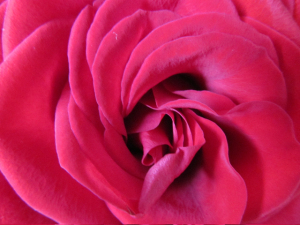
Photo: https://www.etsy.com/shop/DKirkupDesigns
My sister-in-law, Happy, and I share a piece of personal history: If it weren’t for war, we might never have been born, let alone been Americans. In my case, a U.S. Army officer fell for a British girl who’d barely survived the Blitz, Happy’s life began in Vietnam, in the midst of a whole other war.
Both of our fathers were Army career men. But while my experience of military family holds memories that tend toward nostalgia, Happy, who���s watched her husband deploy to Iraq, and, multiple times, to Afghanistan, experiences military life in more current and challenging ways.
It’s part of a subculture many know little about, which I finally came to recognize as my own when I saw Kris Kristofferson���s film, Brats: Our Journey Home, about growing up military. All of those years of seeing myself as a citizen of the world yet feeling like a misfit when I came back to the States suddenly made sense. Like any overseas living, the military takes you out of the culture you���ve known, immerses you in situations where you must find ways to get along with others then once you return ���home���, things can never be quite the same, Our shared experience of military-family life in childhood is unquestionably a foundation in the bond my husband and I share. So are whole perspectives and ways of being that this experience forged in us. 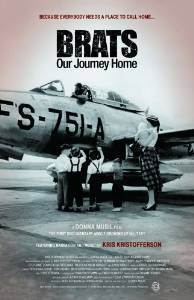
Happy once told me that gender equality is a de facto reality in military families because when your spouse is away for months at a time, every need your family faces comes down to you. Back in the days when my mother kept the home fires burning — or, more accurately, kept starting new ones in different places, that inescapable pattern of military life ��� she relied on the same thing that Happy does: an indomitable sense of humor. It’s vital in a life fraught with potentially immense ups and downs. It’s also proof that no matter what life throws your way, the stable stance of a good nature helps you keep level ground beneath your feet.
Each time Happy’s husband Will has deployed, she hasn’t wanted to answer the phone. She’s already had to live through the latest version of a harrowing conversation about what they’ll do if he doesn’t return. I remember my mother shuddering when a U.S. Army staff car arrived in our neighborhood, heading for someone’s home with ghastly news. You felt the most awful combination of relief and survivor’s guilt as it passed you by.
On the other end are the anguished days between that call that tells you the deployed family member is coming home at last and the day they actually arrive. It would almost be easier not to know, for the uncertain fear that torments you during those tenuous days, Happy says.
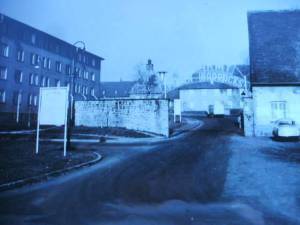
Peden Barracks, Wertheim, Germany, circa 1960s. Once, the gateway to “home”, for my family.
The first night the refrigerator’s icemaker started making funny noises, her husband’s response from the floor above was a regular recon mission as he took the stairs slowly one at a time, freezing in place and braced for action on each one. Happy learned early never to climb into bed after he’s already asleep. He can’t help the inevitable fight-or-flight reaction that months of constant vigilance and inadequate sleep have trained into him. She doesn’t want to put him in a position like that. She knows how badly he feels afterward.
Families like hers make sacrifices while their loved one is in active service, and continue to make them long afterward. Many bide with situations a lot of us couldn’t begin to tolerate, and often do it gracefully and willingly. A lot of them don’t have enough money, while the service they’re rendering is truly immeasurable.
Military commissaries once had a slogan printed on their grocery bags that said: “Military spouse ��� the hardest job in the military.” Through the years and now, the generations, I find these to be some of the bravest and most generous people I know. 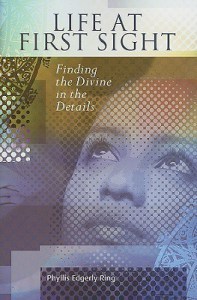
Adapted from Life at First Sight: Finding the Divine in the Details.
Find more about the book at:


May 6, 2015
The balance creative process offers us
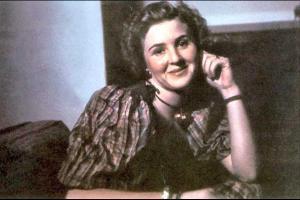 Seven years ago, I made a bid on an eBay item that would change my life in ways I couldn’t have imagined at the time. The portrait of Eva Braun had been drawn by an artist who never gained acclaim for his work, though his infamous name is branded on humanity’s history forever. Eva Braun chose to die with him 70 years ago this spring.
Seven years ago, I made a bid on an eBay item that would change my life in ways I couldn’t have imagined at the time. The portrait of Eva Braun had been drawn by an artist who never gained acclaim for his work, though his infamous name is branded on humanity’s history forever. Eva Braun chose to die with him 70 years ago this spring.
I’d been writing for most of my life but had no awareness of the surprising turn that day was launching for my work. That portrait is at the heart of everything that’s become a part of my novel’s story ever since. Among the many things I didn’t yet know was that the experience of this book would show me that, rather than being something I “do”, writing process is something that acts upon me, strengthening a sense of connection with my own wholeness, and with that of others. My role — my responsibility — is to listen and watch for its revelations, rather than impose ideas or plans of my own on what comes forth as a story — or on anything else.
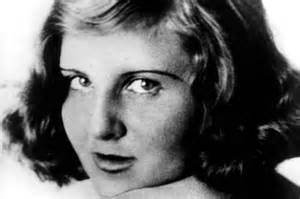 Along the way, I’ve been thankful to discover that this is also a kinder and generally more effective approach to living, and it brings with it an unmistakable cycle of three distinct stages. Writer Penney Peirce offers a helpful model of them in her book, The Intuitive Way. She describes how, moving from a centered place of being, where we can receive what comes to meet us there, we are inspired toward doing, and this takes shape in action that eventually leads to a condition of achieving or having.
Along the way, I’ve been thankful to discover that this is also a kinder and generally more effective approach to living, and it brings with it an unmistakable cycle of three distinct stages. Writer Penney Peirce offers a helpful model of them in her book, The Intuitive Way. She describes how, moving from a centered place of being, where we can receive what comes to meet us there, we are inspired toward doing, and this takes shape in action that eventually leads to a condition of achieving or having.
We may then begin to notice a tailing off, energetically, which is the reminder that it���s time to do what our very cells know they must: rest, recharge, and be restored again to a state of being that���s ready and inspired for the next cycle of expression and activity. Ready to receive, and then express. Cells do not restore themselves after they expend their energy, but are restored by something beyond themselves. Cells seem to know innately the wisdom of returning to their fullest being through the ���re-sourcing��� of what truly sustains them.
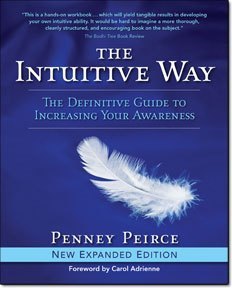 So often today, the world and the insistence of its demands can make it very easy to get caught in just one segment of this cycle ��� stuck on a repeating, depleting loop of constantly attempting to do and to have. I hear of so many creative souls collapsing in a kind of disheartened burnout, and I think a misunderstanding of this cycle may be at the heart of that. If we follow the cycle all the way through, we will naturally realize when it is time for replenishment so that we can again be ready to express, expend, and be effective, with joy.
So often today, the world and the insistence of its demands can make it very easy to get caught in just one segment of this cycle ��� stuck on a repeating, depleting loop of constantly attempting to do and to have. I hear of so many creative souls collapsing in a kind of disheartened burnout, and I think a misunderstanding of this cycle may be at the heart of that. If we follow the cycle all the way through, we will naturally realize when it is time for replenishment so that we can again be ready to express, expend, and be effective, with joy.
Creative process is as much a matter of balance — of finding a stable stance — as any other meaningful experience. It arises both from within us and without, and requires the fullest kind of trusting attention (i.e. presence), which, in a way, is a repeated act of surrender. And of faith. I know that, for many people, hurling themselves at creative process can follow patterns similar to the ways in which they might hurl themselves at life by trying to force or control things. But life, and creative process, are each waiting for us to meet them, I believe, just as our feelings await this, so that they can help us know and understand what it is we need, and what might come next.
 This is not the rational mind’s style, of course. But I’ve come to feel that the mind serves best when it’s not trying to lead, or force, but to follow, as we pursue the things we feel drawn and called to do. When we honor that reality, the things that sustain and help us arrive in ways that will also unfailingly surprise us, because they are beyond anything that our minds, which are confined only to previous experience, could imagine or predict.
This is not the rational mind’s style, of course. But I’ve come to feel that the mind serves best when it’s not trying to lead, or force, but to follow, as we pursue the things we feel drawn and called to do. When we honor that reality, the things that sustain and help us arrive in ways that will also unfailingly surprise us, because they are beyond anything that our minds, which are confined only to previous experience, could imagine or predict.
When we open up to meeting the greater possibilities of what we don’t yet know, our minds will be repeatedly astonished by what is disarmingly precise,�� unfathomably generous, and remarkably right.



